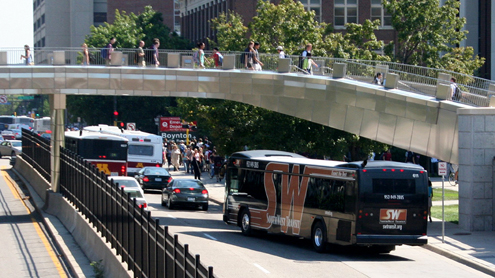
Why and how Southwest Transit outsources with First Transit
By David Hubbard

Southwest Transit, Eden Prairie, MN, serves the workforce and students who make the 30-mile run from Chaska, Shakopee and Eden Prairie into Minneapolis and the University of Minnesota.
Relying on its long-standing partner, First Transit, Cincinnati, OH, a division of FirstGroup America, to hire, train and manage the drivers, the upscale commuter service has operated from these major suburbs for the last 25 years essentially as a precursor to bus rapid transit. Except for the dedicated lanes and loading ramps specific to BRT, the service provides the same convenient commute in the comfort of a modern motorcoach.
According to Southwest Transit CEO Len Simich, the regular customers from these highly affluent communities are highly educated and attuned to the urban lifestyle.
“This group has clearly required us to work outside the normal definitions of transit service,” says Simich. “We are continually upgrading and refining every aspect of the operation from the coaches and facilities to the drivers delivering customer service.”
Simich goes on to say this demographic has higher expectations and many more choices than the average transit customer.
“No one feels forced to commute,” he says. “If they are not comfortable on the coach, or do not feel totally satisfied with the experience, they can always drive. While that is true for transit in general, we feel especially challenged to draw these commuters out of their cars. We have no other alternative but to do everything on a high level.”
The agency seems to have it under control, with ridership doubling over the last 10 years.
“These last two years have been a challenge, as ridership ties directly to employment,” says Simich. “But we are seeing it turn around. We were up nearly 5 percent in 2011.”
Southwest Transit operates 60 buses and coaches, 33 of which are MCI commuter coaches. Assorted New Flyer and Gillig transit buses comprise the rest of the fleet, as well as a Glaval cutaway for use in circulator and shuttle runs.
Simich says Southwest Transit was first to run commuter-style motorcoaches into the Twin Cities.
“Our coaches are authorized to use the HOV lanes and shoulders on Interstate 394 into Minneapolis,” says Simich. “The ride is approximately 25 minutes, beating the cars by 10 minutes.”
He says the time difference is critical in attracting and retaining commuter coach, in addition to the comfort and onboard amenities. It seems to be working. In Eden Prairie, the five-level parking ramp accommodates 1,000 vehicles and it usually fills by 8:30 a.m.
The choice to outsource
First Transit has teamed with Southwest Transit since 1989 when the agency first considered its option of outsourcing certain components of the operation.
“The case with many municipalities is the transportation arm lacks the expertise to correctly implement the safest and most cost effective service,” says Dave Simoneau, First Transit project manager for this operation. “Southwest Transit determined First Transit could probably do a better job establishing and maintaining a first rate team of highly qualified drivers.”
Simich says while both parties benefit from the longevity of this partnership, part of the process is for him and his staff to weigh the pros and cons of the contract every two years.
“First Transit is an organization for hire,” he says. “That means our costs for its services are always a consideration. We have to always ask if we can do it as well for less money by bringing it in-house or going with another contractor.”
Simich says because First Transit has delivered quality service for a favorable fee for so many years, Southwest Transit tends toward keeping the relationship intact.
Simoneau, who has served alongside Southwest Transit for 17 years and just as easily sees himself as a Southwest Transit employee, says this partnership runs smoothly because of the simplified operational goal.
“With only the driver component to operate and manage, we can give all our attention to transporting customers safely and on time, and delivering great service,” he says. “I think both entities agree this has grown beyond the typical contractor-vendor relationship into a true operational partnership, especially over the last 12 years.”
Together, the two entities have met budget challenges through creative solutions that have led to greater efficiency.
One example is the system First Transit devised to allow the buses to remain downtown between the morning and evening runs, which Simich says saves the fuel of 20 coaches a day coming and going.
Once the passengers are delivered in the morning, the coaches move to a secured parking lot where a shuttle transports the drivers back to the yard and return on the shuttle later in the day for their afternoon runs.
“Another tremendous advantage for us is to not be the ones to sit and negotiate with the unions,” says Simich. “While we may give up some say in who we hire, who we promote, and which drivers work on particular routes, in issues where the rubber hits the road, the advantages for our outsourcing to First Transit far outweigh any disadvantages.”
Beyond bus stops and park-and-ride facilities, Southwest Transit enjoys the opportunity to develop further its properties as bona fide transit-oriented communities that place condominiums and retail space as close as possible to the bus service.
The first such development in Eden Prairie features 230 condominiums and 130,000- square feet of retail space.
“Because Southwest Transit owns the property, we have been able to develop this infrastructure,” says Simich. “These assets outside our normal transit activities generate a generous cash flow for us, and have enabled us to hold our own and grow over the last few years.” BR
